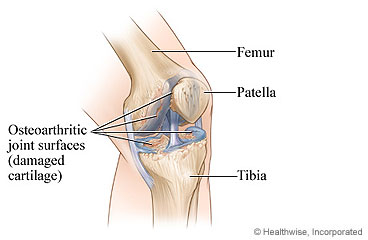
What is a total knee replacement?
A total knee replacement replaces the worn ends of the bones where they meet at the knee. Those bones are the thighbone (femur) and the lower leg bone (tibia). Your doctor will remove the damaged bone. Then your doctor will replace it with plastic and metal parts. These new parts may be attached to your bones with cement.
Your doctor will make a cut down the center of your knee. This cut is called an incision. It will be several inches long. Sometimes the surgery can be done with a smaller incision. Both kinds of incisions leave scars that usually fade with time.
Your doctor will let you know if you will stay in the hospital or if you can go home the day of surgery. If you have both knees done at the same time, you may need to be in the hospital for a few days.
Most people go back to normal activities or work in 4 to 16 weeks. This depends on your health. It also depends on how well your knee does in your rehab program. This may take longer if you have both knees done at the same time.
How do you prepare for surgery?
Surgery can be stressful. This information will help you understand what you can expect. And it will help you safely prepare for surgery.
 Preparing for surgery
Preparing for surgery
- You may need to shower or bathe with a special soap the night before and the morning of your surgery. The soap contains chlorhexidine. It reduces the amount of bacteria on your skin that could cause an infection after surgery.
- Be sure you have someone to take you home. Anesthesia and pain medicine will make it unsafe for you to drive or get home on your own.
- Understand exactly what surgery is planned, along with the risks, benefits, and other options.
- If you take a medicine that prevents blood clots, your doctor may tell you to stop taking it before your surgery. Or your doctor may tell you to keep taking it. (These medicines include aspirin and other blood thinners.) Make sure that you understand exactly what your doctor wants you to do.
- Tell your doctor ALL the medicines, vitamins, supplements, and herbal remedies you take. Some may increase the risk of problems during your surgery. Your doctor will tell you if you should stop taking any of them before the surgery and how soon to do it.
- Make sure your doctor and the hospital have a copy of your advance directive. If you don't have one, you may want to prepare one. It lets others know your health care wishes. It's a good thing to have before any type of surgery or procedure.
What happens on the day of surgery?
-
Follow the instructions exactly about when to stop eating and drinking. If you don't, your surgery may be canceled. If your doctor told you to take your medicines on the day of surgery, take them with only a sip of water.
-
Take a bath or shower before you come in for your surgery. Do not apply lotions, perfumes, deodorants, or nail polish.
-
Do not shave the surgical site yourself.
-
Take off all jewelry and piercings. And take out contact lenses, if you wear them.
At the hospital or surgery center
-
Bring a picture ID.
-
The area for surgery is often marked to make sure there are no errors.
-
You will be kept comfortable and safe by your anesthesia provider. The anesthesia may make you sleep. Or it may just numb the area being worked on.
-
You also will get antibiotics through the I.V. tube before surgery. This lowers the risk of an infection of the incision.
-
The surgery will take about 2 to 3 hours.
When should you call your doctor?
- You have questions or concerns.
- You don't understand how to prepare for your surgery.
- You become ill before the surgery (such as fever, flu, or a cold).
- You need to reschedule or have changed your mind about having the surgery.
Where can you learn more?
Go to http://www.healthwise.net/patientEd
Enter F652 in the search box to learn more about "Total Knee Replacement: Before Your Surgery".
Current as of: July 17, 2023
Author: Ignite Healthwise, LLC Staff
Clinical Review Board
All Healthwise education is reviewed by a team that includes physicians, nurses, advanced practitioners, registered dieticians, and other healthcare professionals.

